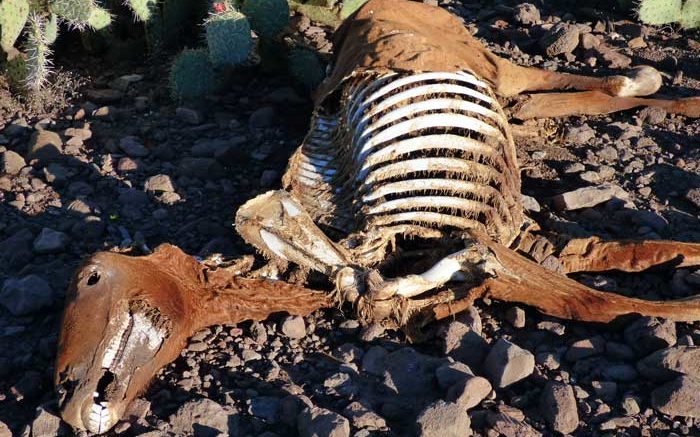Editorial By Mike Bibb
What do the deaths of two horses and a mule and a raging fire on Mount Graham have in common? Both incidents are the result of U.S. Forest Service incompetency.
According to recent news reports, two horses and a mule under the watchful eyes of the USFS in Greenlee County, Clifton District, died from dehydration last summer because the Forest Service neglected to provide the animals with an adequate supply of drinking water.
In case the reader is not familiar with death-by-dehydration, it is not a very pleasant thing to endure. Unfortunately, in this particular situation the animals’ demise wasn’t caused by a harsh act of nature, rather their prolonged torture was the result of negligence and animal cruelty inflicted by certain USFS employees who, for whatever reasons, failed to maintain proper care for the creatures.
As a result, not only were the poor equines subjected to intensive heat and sun, but had to do so without benefit of water. Common sense should have provoked a few USFS consciences into realizing the seriousness of the situation and provide immediate relief.
It didn’t and the animals perished. Cut and dry.
Well, not quite. When dealing with the government, things often become discombobulated, especially when lawyers are tossed into the mix.
After becoming aware of the incident, the Greenlee County Sheriff’s Office and Greenlee County Attorney’s Office compelled two USFS employees to appear in court and respond to multiple counts of animal cruelty. This seemed like a logical procedure because the alleged crimes happened in Greenlee County and the Forest Service was hesitant in disciplining the employees involved or even publicly discussing the matter.
According to information obtained by Dexter K. Oliver, a Greenlee County resident and freelance writer/wildlife consultant, the USFS petitioned to have the case removed from Greenlee County and placed into federal jurisdiction because the defendants were federal employees of the Forest Service.
Greenlee County agreed and dropped the case thinking it would be resolved in Federal District Court in Tucson.
It was – sort of. An attorney representing one of the USFS employees claimed his client was a federal law enforcement officer, therefore immune from prosecution because of the Supremacy Clause of the United States Constitution. The district court apparently concurred and dismissed the charges.
A clever ruse, but hardly applicable in this case. The “Supremacy Clause” of the United States Constitution (Article VI, Clause 2) establishes that the Constitution, federal laws made pursuant to it and treaties made under its authority, constitute the supreme law of the land. The key word in this declaration is “pursuant” meaning only laws enacted in conformity with the mandates laid down in the Constitution can be considered the supreme law of the land. Laws and regulations passed outside this requirement are not.
So, either the federal judge in this case did not understand the limits of the Supremacy Clause, or he chose to modify it. In essence, legislating from the bench. Furthermore, claiming a regular forest worker was a “law enforcement officer immune from prosecution” because of his status as a federal employee really stretches the boundaries and stated intent of Article VI.
If this is how future litigation against federal agencies and employees is going to be decided, then an ordinary citizen doesn’t have a chance fighting back or defending himself against an overly intrusive or lawless government. Unless he has the determination and financial wherewithal to carry his case to the Supreme Court, then “his day in court” will have ended at the lower level of justice.
We’ve seen this movie before involving IRS abuses and massive government spying on the general public by the National Security Agency. In spite of congressional investigations and questioning of department directors, no one, to my knowledge, has been indicted or even held accountable.
Since charges of animal cruelty – corroborated with documented evidence – can be nonchalantly brushed aside by a federal judge somewhere, then anyone thinking of suing the USFS for personal property damages which might result from the Frye Fire currently burning on Mount Graham or because of Forest Service negligence relating to the fire could have a difficult time convincing a court.
If the deck is already stacked, then chances of getting a fair deal are almost nonexistent.
The views and opinions expressed in this editorial are those of the author.













